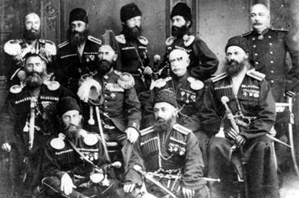Abkhazia
File:National anthem of Abkhazia – Aiaaira (Аиааира) (orchestral vocal version).ogg
Abkhazia is a region in the South Caucasus, lying on the eastern coast of the Black Sea and bordered to the north by Russia, to the east by the Georgian region of Samegrelo-Zemo Svaneti, and to the south by the Turkish and Georgian border. It covers an area of about 8,660 square kilometers and has a population of approximately 240,000 to 250,000 people. The capital of Abkhazia is Sukhumi, which serves as the political and cultural center of the region.
History[edit | edit source]
The history of Abkhazia is complex, characterized by its strategic location and the influence of various empires and cultures over the centuries. In antiquity, it was part of the kingdom of Colchis and later the Roman and Byzantine Empires. During the Middle Ages, Abkhazia was a battleground between the Byzantines, Ottomans, and Georgians, eventually becoming part of the Georgian kingdom. In the 19th century, it was annexed by the Russian Empire. Following the Russian Revolution, Abkhazia became a contested region, eventually being incorporated into the Soviet Union as part of the Georgian SSR.
The late 20th century saw rising tensions between the Abkhaz and Georgian populations, culminating in the Abkhazia War of 1992-1993, after the dissolution of the Soviet Union. The conflict resulted in the de facto independence of Abkhazia, although it remains internationally recognized as part of Georgia. The region has since been supported by Russia, which has a significant military presence there.
Politics[edit | edit source]
Abkhazia operates as a de facto independent state, with its own government, military, and constitution. However, its sovereignty is recognized by only a few UN member states, including Russia, Nicaragua, Venezuela, and Nauru. The region remains a point of contention in Georgian-Russian relations and is subject to international negotiations and peacekeeping efforts.
Geography and Climate[edit | edit source]
Abkhazia is known for its rich natural beauty, featuring a diverse landscape of beaches, mountains, and forests. The region's climate is humid subtropical along the coast, with mild winters and hot summers, transitioning to a more temperate climate in the mountains. This biodiversity supports a variety of flora and fauna, making it a destination for ecotourism and outdoor activities.
Economy[edit | edit source]
The economy of Abkhazia is small and heavily reliant on agriculture, tourism, and Russian financial support. Key agricultural products include tobacco, tea, wine, and fruits. Tourism has grown in importance, with visitors attracted to the region's natural beauty and historical sites. However, economic development is hindered by political isolation and the lack of international recognition.
Demographics[edit | edit source]
The population of Abkhazia is ethnically diverse, with Abkhaz, Georgians, Russians, Armenians, and Greeks among the major groups. The official languages are Abkhaz and Russian, with Georgian also spoken within the community. The conflict and subsequent ethnic cleansing have significantly altered the demographic landscape, leading to a large number of internally displaced persons and refugees.
Culture[edit | edit source]
Abkhazia has a rich cultural heritage, reflecting the influences of the many peoples and empires that have controlled the region. This includes unique traditions in music, dance, and cuisine, as well as a strong tradition of hospitality. The region is also home to several historical sites, including ancient churches and fortresses, which testify to its complex history.
Search WikiMD
Ad.Tired of being Overweight? Try W8MD's physician weight loss program.
Semaglutide (Ozempic / Wegovy and Tirzepatide (Mounjaro / Zepbound) available.
Advertise on WikiMD
|
WikiMD's Wellness Encyclopedia |
| Let Food Be Thy Medicine Medicine Thy Food - Hippocrates |
Translate this page: - East Asian
中文,
日本,
한국어,
South Asian
हिन्दी,
தமிழ்,
తెలుగు,
Urdu,
ಕನ್ನಡ,
Southeast Asian
Indonesian,
Vietnamese,
Thai,
မြန်မာဘာသာ,
বাংলা
European
español,
Deutsch,
français,
Greek,
português do Brasil,
polski,
română,
русский,
Nederlands,
norsk,
svenska,
suomi,
Italian
Middle Eastern & African
عربى,
Turkish,
Persian,
Hebrew,
Afrikaans,
isiZulu,
Kiswahili,
Other
Bulgarian,
Hungarian,
Czech,
Swedish,
മലയാളം,
मराठी,
ਪੰਜਾਬੀ,
ગુજરાતી,
Portuguese,
Ukrainian
Medical Disclaimer: WikiMD is not a substitute for professional medical advice. The information on WikiMD is provided as an information resource only, may be incorrect, outdated or misleading, and is not to be used or relied on for any diagnostic or treatment purposes. Please consult your health care provider before making any healthcare decisions or for guidance about a specific medical condition. WikiMD expressly disclaims responsibility, and shall have no liability, for any damages, loss, injury, or liability whatsoever suffered as a result of your reliance on the information contained in this site. By visiting this site you agree to the foregoing terms and conditions, which may from time to time be changed or supplemented by WikiMD. If you do not agree to the foregoing terms and conditions, you should not enter or use this site. See full disclaimer.
Credits:Most images are courtesy of Wikimedia commons, and templates, categories Wikipedia, licensed under CC BY SA or similar.
Contributors: Prab R. Tumpati, MD




